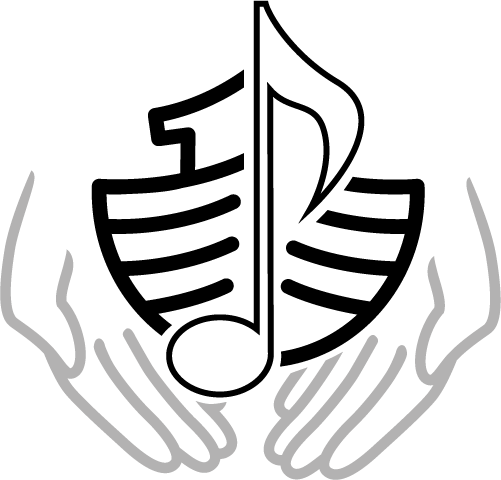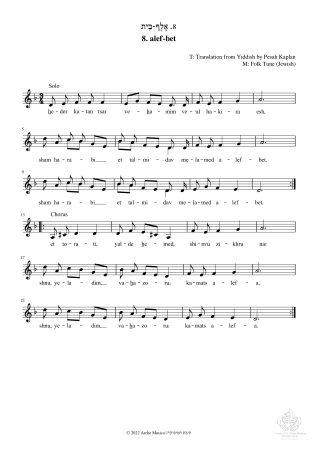אלף-בית | Aleph-bet | Alef-Bet (1912)
Artist: Abraham Zvi Idelsohn (1882-1938)
Lyrics: Mark Warshawsky (Translation from Yiddish by Pesah Kaplan)
Tune: Folk Tune (Jewish)
The text of this song was published in the second volume of Ha-Zamir (Odessa, 19031: p. 4). The Hebrew translation of the original Yiddish song was published in the children's newspaper Olam Katan [A Small World] in 1903 as well.
“Alef-Bet” is based on the Yiddish song, "Der Alef-Beys" [The Aleph Bet], which was written, composed, and published by Mark Warshawsky (1840-1907) in 1901. Warshawsky published an anthology of twenty-five Yiddish songs, titled Yiddish Folkslider [Jewish Folksongs]; lyrics (Kiev, 1900) and later melodies with piano accompaniment (Warsaw, 1901). This song, which opens the anthology, is also known as "Oyfn Pripetchik [At the Fireplace] or, in Hebrew, "Heder Katan" [A Small Room] following the first words of the song. The original Yiddish song contains five verses. The second verse is sung after verses 2-5 and creates a verse-refrain structure; the first verse opens and closes the song.
In Sefer Ha-Shirim, Idelsohn wrote that the text is a translation from "zargonit" (slang), meaning Yiddish, and that the melody is "Polish", a designation that he used to refer to most of the Yiddish melodies he included in his book.
The text describes a heder (elementary school) where Jewish children study. A flame burns in the fireplace; the room is cozy; the rabbi teaches the children the Hebrew alphabet, beginning with the first two letters: alef-bet. He says: "remember dear children, what you learn here. Please repeat: komets alef is pronounced O (in Yiddish) (in the Hebrew transliteration, kamats alef is pronounced A). Jewish children studied Hebrew using an Ashkenazic pronunciation, through singing and repeating after the teacher-rabbi. For centuries, Hebrew was considered a "holy language", reserved for liturgical purposes, while Yiddish was the secular language of Ashkenazi Jews in Eastern Europe. The Zionists decided to make Hebrew a secular language after the return to Erets Yisrael, and thus Hebrew became the national language of the State of Israel.
In the Yiddish version of “Alef-Bet”, the rabbi tells the children: "when you grow older you will understand that in the alphabet the tears of the Jewish people from their burden of exile are kept, and from these Hebrew letters one will also find the strength to go on and create new and free life”. In the Hebrew version, these verses are omitted. Idelsohn added another verse: "Beginnings are difficult, but afterwards things become easier; happy is the one who studies Torah".
The Yiddish writer Sholem Aleichem (1859-1916) promoted the Yiddish folksongs of Warshawsky, claiming that they represented the true expression of Jewish emotion and thought. Jewish composer Joel Engel (1868-1927) took a different view, however, and argued that Warshawsky's folksongs are not Jewish in essence, but rather European.
“Aleph-bet” is arranged for solo and choir. The choir repeats the second part of the first verse as a refrain. The solo part is in a minor mode. The refrain uses an augmented second, also known as the Ahava Raba mode, which is common in Eastern European Jewish music and resembles a melodic minor mode.
In 1993, under the title "OYF'N Pripetshik", the famous composer John Williams created from this song one of the key melodies to Steven Spielberg's movie "Schindler's List". In 1994 John Williams received the Oscar "Best Music" for his compositions to Spielberg's award-winning masterpiece.
Included in
Scores
Original (PDF) Modernized (PDF) Accessible (PDF)

